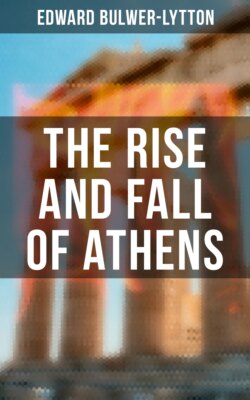The Rise and Fall of Athens

Реклама. ООО «ЛитРес», ИНН: 7719571260.
Оглавление
Эдвард Бульвер-Литтон. The Rise and Fall of Athens
The Rise and Fall of Athens
Table of Contents
Volume I
Table of Contents
BOOK I
CHAPTER I
CHAPTER II
CHAPTER III
CHAPTER IV
CHAPTER V
CHAPTER VI
CHAPTER VII
Governments in Greece
CHAPTER VIII
BOOK II
CHAPTER I
CHAPTER II
CHAPTER III
CHAPTER IV
CHAPTER V
Volume II
Table of Contents
BOOK III
CHAPTER I
CHAPTER II
CHAPTER III
CHAPTER IV
CHAPTER V
CHAPTER VI
CHAPTER VII
CHAPTER VIII
BOOK IV
CHAPTER I
CHAPTER II
CHAPTER III
CHAPTER IV
CHAPTER V
BOOK V
CHAPTER I
CHAPTER II
CHAPTER III
CHAPTER IV
The Tragedies of Sophocles
FOOTNOTES
Отрывок из книги
Edward Bulwer-Lytton
OK Publishing, 2020
.....
As one source of religion was in external objects, so another is to be found in internal sensations and emotions. The passions are so powerful in their effects upon individuals and nations, that we can be little surprised to find those effects attributed to the instigation and influence of a supernatural being. Love is individualized and personified in nearly all mythologies; and LOVE therefore ranks among the earliest of the Grecian gods. Fear or terror, whose influence is often so strange, sudden, and unaccountable—seizing even the bravest—spreading through numbers with all the speed of an electric sympathy—and deciding in a moment the destiny of an army or the ruin of a tribe—is another of those passions, easily supposed the afflatus of some preternatural power, and easily, therefore, susceptible of personification. And the pride of men, more especially if habitually courageous and warlike, will gladly yield to the credulities which shelter a degrading and unwonted infirmity beneath the agency of a superior being. TERROR, therefore, received a shape and found an altar probably as early at least as the heroic age. According to Plutarch, Theseus sacrificed to Terror previous to his battle with the Amazons;—an idle tale, it is true, but proving, perhaps, the antiquity of a tradition. As society advanced from barbarism arose more intellectual creations—as cities were built, and as in the constant flux and reflux of martial tribes cities were overthrown, the elements of the social state grew into personification, to which influence was attributed and reverence paid. Thus were fixed into divinity and shape, ORDER, PEACE, JUSTICE, and the stern and gloomy ORCOS 27, witness of the oath, avenger of the perjury.
This, the second source of religion, though more subtle and refined in its creations, had still its origin in the same human causes as the first, viz., anticipation of good and apprehension of evil. Of deities so created, many, however, were the inventions of poets—(poetic metaphor is a fruitful mother of mythological fable)—many also were the graceful refinements of a subsequent age. But some (and nearly all those I have enumerated) may be traced to the earliest period to which such researches can ascend. It is obvious that the eldest would be connected with the passions—the more modern with the intellect.
.....